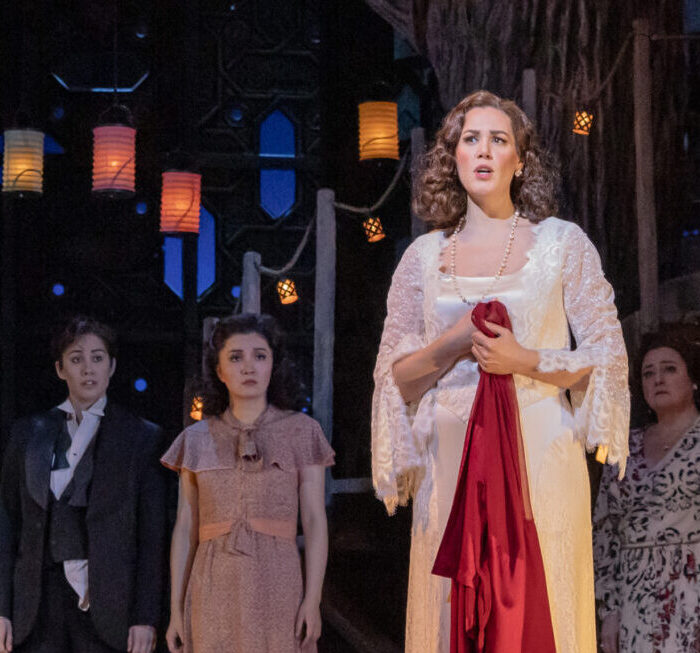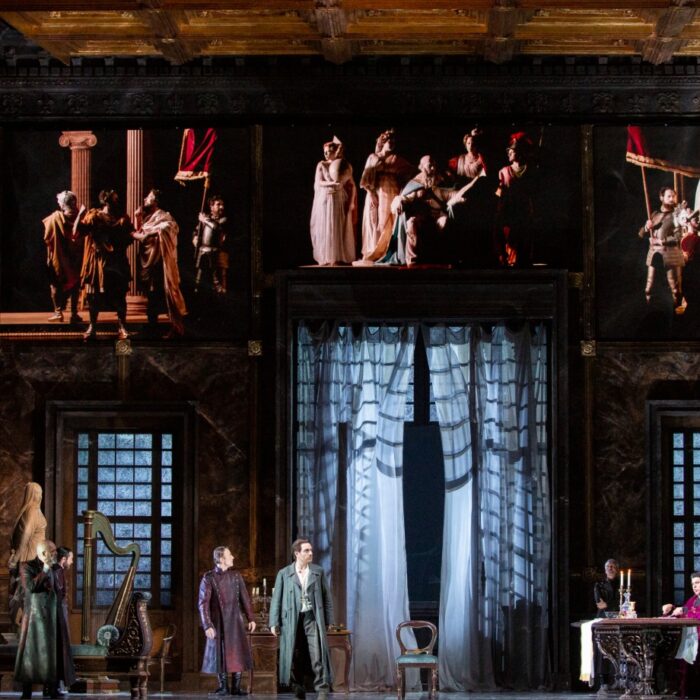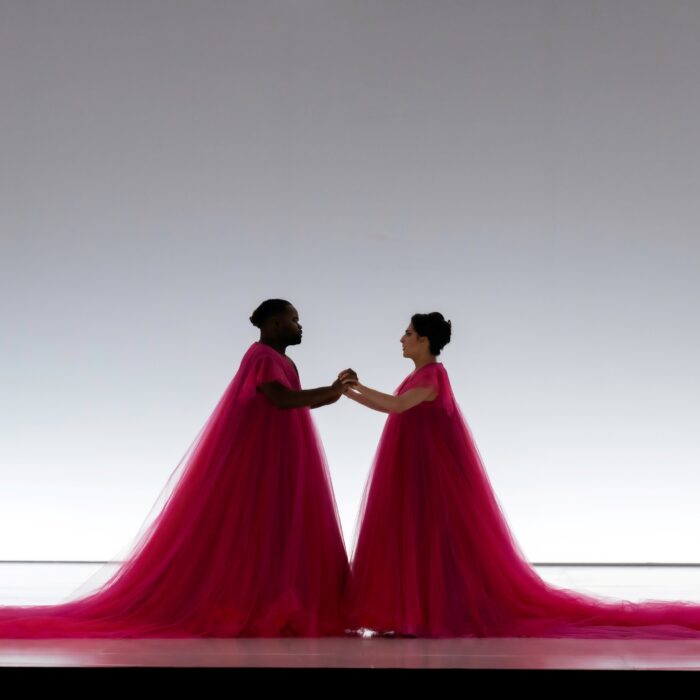
Glyndebourne Opera Festival 2024 Review: Tristan und Isolde
Daniel Dooner’s Revival of Nikolaus Lehnhoff’s Production is No Ordinary Opera
By Mike Hardy(Photo credit:
Glyndebourne’s own official trailer highlights its festival as “No Ordinary Opera”. Certainly, the staging for “Tristan und Isolde” is far from ordinary, courtesy of a visually entrancing setting by Ronald Aeschlimann. The performers are basically encased in an elliptical vortex-type form of concentric circles, which I interpreted to be a depiction of some portal-like presence intended to illustrate the metaphysical constructs being presented.
In fact, I couldn’t help but identify this staging as being redolent of the famous gun-barrel sequence which pre-empts every James Bond film’s opening credits where 007 nonchalantly walks across the stage before turning and shooting his Walther PPK towards the audience.
Striking and entrancing though it was, I found it a tad disorienting, creating a subtle dizzy sensation, similar to that when observing the spot in the middle of a hypno-wheel. With its steep, curvaceous inclines and its tall steps, I also instantly opined that it looked as though it could prove to be a somewhat potential nightmare for the performers to confidently navigate with a degree of ease. In fact, immediately before curtain up, an announcement was made explaining that Karen Cargill had incurred an injury and was unable to traverse the stage, so would be singing the role of Brangäne from the SIDE of the stage, whilst her part would be acted ON stage by Marlene Lichtenberg.
Further inquiries revealed that, apparently, the stricken soprano had actually incurred her injuries whilst rehearsing the role on this very stage, and once the performers started moving on the set, it was all so easy to see how it could have happened. Ironically, Lichtenberg almost succumbed to a fall herself upon entering the stage from its steep, swooping gradient on the left.
It would be interesting to know how Lichtenberg, HERSELF a mezzo-soprano who has sung this role previously, actually felt about performing the part whilst having to relinquish the vocal duties to another. In fact, whilst this arrangement worked, to some degree, Lichtenberg was frequently positioned at the opposite side of the stage to the place where Cargill was positioned, and so it merely served to highlight the fact that the former was miming.
Based on a medieval tale, “Tristan und Isolde” is a story of love, life, hope and death. It tells of myths, mysticism and love potions. And in Daniel Dooner’s revival of Nikolaus Lehnhoff’s production, it’s all about the allegorical. There is NO, ostensible burning desire or perceivable passion between the eponymous lovers, who simply express their desires for each other with wistful gazing into one another’s eyes and an occasional innocent embrace. They speak frequently of thwarted love and death, and the unity that the latter may bring. They labour through a libretto, written by Wagner himself, whose prose appropriates that of the era from when the original tale was written, the Middle Ages, when knighthood and the chivalric code prevailed. Consequently, perhaps also as a result of something lost in translation, the portrayal lacks true poetry or emotional intensity. Together with a staging and direction that renders the performers fairly static for much of the performance, and when they DO move, it is clearly labour intensive or, as in the case of the ‘fight scenes’, ill-thought out, haphazard, clumsy and without any conviction.
Illuminating Voices
That is not to say that this was not a stellar cast of fine voices, for it most certainly was. Isolde, performed by Finnish soprano Miina-Liisa Värelä sang with full bodied authority, having rich, creamy tones. I detected a slight loss of shaping in the extreme upper registers, which took on an occasional shrillness. Such imperfection, however, did not detract from an otherwise solid performance. Her final “Liebestod”, where she sings over her lover’s expired body, was particularly moving and impressive, especially given her deep, set-back position on the stage.
Karen Cargill may have suffered a nasty fall which impaired her mobility, but her voice remained supremely agile in her role as Isolde’s faithful maid, Brangäne. She sang with remarkable projection. Cargill’s voice is a fine, piercing mezzo which resonated well around the house; how much of this due to her stance at the elevated side of the stage, however, we can not know.
More Cast Highlights
Australian heldentenor Stuart Skelton probably lamented that he was not afforded the luxury of being able to sing from a static, comfortable position. His physical exertions were amplified, his efforts in climbing the ‘staircase’ section of the vortex setting were clearly demanding. His descending of the same were noticeably problematic. He frequently had to use his hands on his knees to provide any leverage and support on moving. That said, he did an admirable job in navigating the oppressive scenery and vocally, he was most accomplished. He showed a propensity to sing softly in some passages, presumably as required by the score, as opposed to any deliberation, but quite possibly because of the acoustic infringements posed by the set. At times, though, his voice soared magnificently, showing the fine, polished straight tones so typical of true heldentenors. His second act interactions with Isolde, and his anguished, introspection in the final act were particular commendable, especially the latter where he showed fine, dramatic skills which confirm his authority as an accomplished actor as well as a solid voice.
Tristan’s trusted friend and servant, Kurwenal, was played by Chinese bass-baritone Shenyang, a former BBC Cardiff Singer of the World competition winner. He has a robust, commanding instrument which really came to life in his interactions with Tristan, particularly in the final act, where he was not only vocally pleasing, but acted with some conviction. The interactions here were more emotive and compelling than those between Tristan and Isolde.
Stellar Vocal Performance
Quite possibly the vocal performance of the evening award might have been edged by veteran German bass Franz-Josef Selig as King Marke. His presence was unquestionably regal, his voice a luxuriously rich palette of nuanced colours with a pronounced ability to infuse his passages with great expressiveness. In his second act lament, where he discovers his nephew’s betrayal, and in the final act where he sought to give forgiveness, he sang with near tangible ardency.
Australian tenor Samuel Sakker whilst competent, struck me as being somewhat perfunctory in his role as Melot, and I couldn’t help thinking that he perceived his role as being something of a demotion, given that he has sung the lead role of Tristan previously, several times elsewhere in Europe.
The role of the young sailor and shepherd were played by English/Indian tenor Caspar Singh who impressed me with his sweet, lyric tenor voice, imbued as it was with a wonderful timbre and clarity.
Orchestra and Production Details
The enforced inertia on stage didn’t extend to the pit, where conductor Robin Ticciati had an absolute ball with the London Philharmonic, infusing the whole with animated dynamism and coaxing beautiful musicality from the orchestra.
Despite my somewhat negative observations on the setting and scenery of this staging, particularly in reference to those poor souls who have to try and attempt to traverse it, I do have to say that visually it was most captivating. Not least because of the quite brilliant and effective use of lighting, courtesy of lighting director Robin Carter. From the opening scenes, where the stage was revealed via a small square, gradually increasing in dimension in such a manner as to convince one that they were watching a projected image or video effect; from the vivid purples blues and reds, often produced with clever filters to create an ethereal quality, to the bright red of the bottled love potion, the only splash of color in an otherwise grey, visually oppressive first act. Combined with the use of isolating spots and gels, the final “Liebestod” aria where Isolde almost appeared to be levitating, produced a most mesmerizing, almost religious experience, a true masterpiece of the illuminator’s artistry.
Richard Wagner’s Musical Perspective
I wouldn’t want to turn this review into an analytical treatise or thesis on the composer, Richard Wagner, but I find it impossible to consider productions of his works without at least alluding to his compositional methods.
A divisive figure, musically, both in his lifetime and up to the modern day, his works are revered and castigated in equal measure, and often with equal intensity. Many scholarly articles have been written about his music, particularly “Tristan und Isolde”. During the latter half of the 19th century, it was heavily debated and discussed in every new city that dared to produce it.
It has been asserted that no other person, before or since, has had such a profound effect on opera and singing. It has also been asserted that Wagner deliberately veered away from traditional notions of tonal stability, and that, to MY ear, is exactly how much of his music sounds. Atonal. More, frustratingly, I find he writes passages of beauty that start to promise so much, yet fail to deliver, switching in an instant from melodious to strident; from harmonious to discordant; soothing to dissonant. These are hallmarks of Wagner’s music. It is as though he is aware of the inherent beauty and fulfillment that his compositions are veering towards and so he takes deliberate and decisive action to counter that. His finest work, in my opinion, lies in his preludes, his choruses and his interludes. It is when he writes for the voice that, in his overwhelming desire to be so uniquely different, he loses shape and form.
Ironically, the very final passage of this opera DOES deliver that all-encompassing, serene beauty that his score occasionally hints at, which for ME makes the opera all that more frustrating and unfulfilled.
I am also aware that true aficionados and Wagnerians are gathering their pitchforks as they read this. In mitigation, I will offer only this:
Wagner is an acquired taste.
One which I have yet to acquire.



